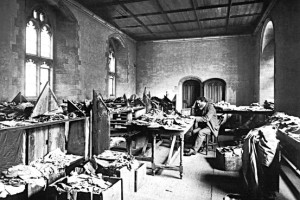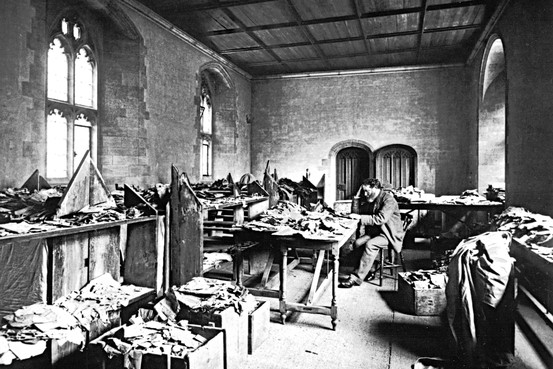 Geniza Document, trans. S. D. Goitein, in Mosseri Collection, L-12, Letters of Medieval Jewish Traders (Princeton, 1973), pp. 213–15. Excerpted from Norman Stillman, Jews of Arab Lands, 247-248.
Geniza Document, trans. S. D. Goitein, in Mosseri Collection, L-12, Letters of Medieval Jewish Traders (Princeton, 1973), pp. 213–15. Excerpted from Norman Stillman, Jews of Arab Lands, 247-248.
(August 1198)
to Aden. Immediately after his arrival he was brought before the self-styled caliph, who said to him: “Become a Muslim, or you will cause the death of your brethren.” He cried bitterly, but there was no other way for him . . . except to embrace Islam. Before his arrival in Aden, all those who were with him on the mountains had apostatized;1 the physician known as the Efficient, and everyone on the mountains apostatized; only the Jews of Aden remained. But the elder Madmūn2 accepted Islam on Wednesday, the first of Dhu ’l-Qa‘da (25 August 1198). On Friday, the third, the bell (of the market-crier) was rung: “Community of Jews, all of you, anyone who will be late in appearing in the audience hall after noon, will be killed.” Moreover, he (the caliph) ordered that anyone returning to the Jewish faith would be killed. Thus all apostatized. Some of the very religious, who defected from Islam, were beheaded.
As to us (the foreign Jewish merchants), do not ask what we felt, witnessing horrors the like of which we had never seen.
But with us God wrought a miracle and saved us, not through our might and power, but through His Grace and favor. For when we went up with them to the audience hall, the foreigners assembled separately, and the caliph was consulted about them. God put these words into his mouth: “No foreigner should be molested.”3 He ordered that everyone should pay a third of the poll tax.4 We disbursed this and he dismissed us graciously, thank God. This is the upshot of what happened. But, by the great God, I am really not able to convey to you even part of what happened, for witnessing an event is one thing and hearing about it—quite another.
The merchants were outraged by the new impositions promulgated. Finally, however, God, the Exalted, helped. The caliph had ordered that 15 out of 100 dinars should be taken from everyone both at arrival and departure, but God helped, and he ordered that this Kārim5 should remain unchanged with no rise in tariff. But everyone coming later would have to pay 15 out of 100 dinars from all goods, and also from gold and silver, from wheat and flour, in short, from everything.6 Such will be the earnings of anyone coming here next year.
(A list of prices for various commodities follows.)
I asked God for guidance and am traveling home in the boat of Ibn Salmūn, the same in which I made the passage out. May God bestow safety upon it. My brother Abū Nasr will be traveling with me. I am kissing your hands and feet.7
1 Heb., pāsha‘, literally, “to renounce one’s allegiance,” was the common word used to express this idea in the Geniza documents. See S. D. Goitein, Mediterranean Society, vol. 2, p. 300.
2 Madmūn b. David, head of the Jewish community of Aden. He is the author of the following letter.
3 S. D. Goitein, Medieval Jewish Traders (Princeton, 1973), p. 214, n. 7, observes here: “This shows that, at that time, the Jewish India traders must have been still of considerable importance for the economy of Aden.”
4 Goitein, Medieval Jewish Traders, p. 214, n. 8: “The poll tax of non-Muslims was to be paid at their permanent residence. Thus, this imposition was illegal. But the travelers were content to buy their religious freedom with this price.”
5 The Kārim was an organization or league of India merchants. Here, however, the word seems to be used for “the totality of India travelers operating during one year,” which Goitein, Medieval Jewish Traders, p. 214, n. 9, points out “is very remarkable.” See his essay, “The Beginnings of the Kārim Merchants and the Character of their Organization,” in Goitein, Studies, pp. 351–60.
6 Goitein, Medieval Jewish Traders, p. 214, n. 10: “Meaning that even from the provisions of the travelers 15 percent had to be turned over to the ruler of Aden.”
7 Goitein, Medieval Jewish Traders, pp. 215–16, n. 20: “One kisses the hands of a senior relative and the feet of a judge. The writer might have been a relative of the judge Isaac b. Sāsōn, who was the Jewish chief judge of Cairo and a close associate of Maimonides, but also very active in the economic field.”
